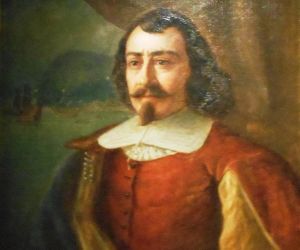One of our staff members is contributing considerably to a News Archiving service at Mu. Any well educated (Masters, PhD or above) users who wish to make comments on news sites, please contact Jim Burton directly rather than using this list, and we can work on maximising view count.
Samuel de Champlain

Samuel de Champlain (born 1574 – died 1635) was a French explorer and cartographer who mapped the coast of Canada and founded Quebec, and New France, on 3 July 1608. An important figure in Canadian history, Champlain created the first accurate coastal map during his explorations, and founded various colonial settlements.
At the age of about 36, Champlain married a 12-year-old female named Hélène Boullé. The contract stated that he could not have sex with her until her 14th birthday, but according to (Bullough 2002, p. 481)[1], he sought permission from her parents to consummate the marriage before that:
Many of those who entered into such relationships, such as Samuel de Champlain (d. 1635), the first governor of French Canada, agreed that they would not have sex with a 12-year-old bride until she was 14, as Champlain did unless he consulted with her family and received their permission to do so earlier. Apparently, he did.
Champlain's marriage was initially quite troubled, but recovered and was apparently good for many years.[2]
Hélène lived in Quebec for several years, but returned to Paris and eventually decided to enter a convent. The couple had no children, and Champlain adopted three Montagnais girls named Faith, Hope, and Charity in the winter of 1627–28.
References
- ↑ Bullough V.L. (1990). “History in adult human sexual behavior with children and adolescents in Western societies”, in Pedophilia: Biosocial Dimensions (Jay R. Feierman, ed.). New York: Springer-Verlag Publishers
- ↑ Fischer, David Hackett (2008). Champlain's Dream. Simon and Schuster. pp. 313-316.